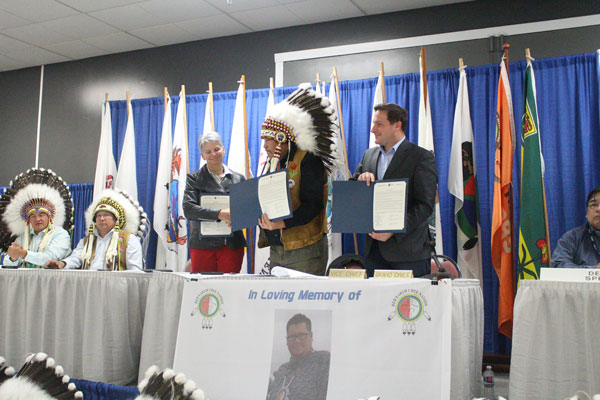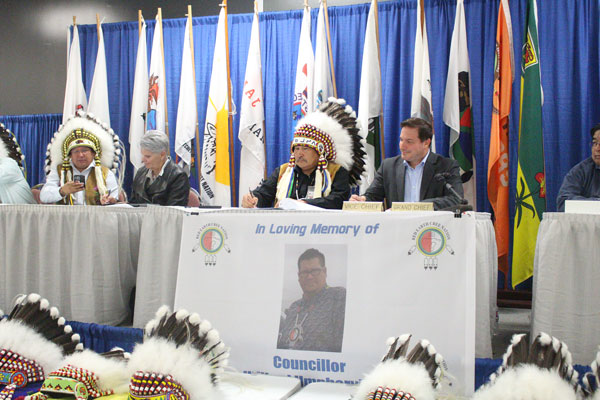
On Monday, the Government of Saskatchewan, the Government of Canada and the Prince Albert Grand Council (PAGC) signed an agreement to explore new, community-oriented ways to deliver police services and improve safety in First Nations communities.
The signing took place at the 2022 Prince Albert Grand Council (PAGC) Annual Assembly at the Prince Albert Exhibition Centre.
PAGC Grand Chief Brian Hardlotte was joined by Corrections, Policing and Public Safety Minister Christine Tell, and Marco Mendicino, Minister of Public Safety, for the announcement of the new collaborative working relationship. Vice Chief Joseph Tsannie of PAGC was one of the chief architects of the letter of intent.
“We have been working on the community policing initiative since 2018,” Tsannie told those in attendance. “We have come a long way. We are ready today to sign that letter of intent between the parties, between Canada, the province and the Prince Albert Grand Council on behalf of our First Nations communities.
The letter of intent calls for the PAGC to pursue a community-oriented public safety model for policing that will provide service to all 12 members nations, and 28 communities.
“It’s a huge undertaking and we have got the initiatives, the mandate from our leadership to look at alternative ways in terms of creating a safe community for our community members and our children,” Tsannie said.
Grand Chief Brian Hardlotte said the consultation process is the first step in creating safer communities. As part of the process, they’ll draw on recommendations from the PAGC’s National Symposium on First Nations Policing and Justice that identified the need to decolonize policing, courts, and corrections in order to address the Truth and Reconciliation Commission’s Calls to Action, as well as the Final Report of the National Inquiry into Missing and Murdered Indigenous Women and Girls.
“What we are signing here is to work toward self-administered policing, to have our own police officers in our communities, to have that opportunity for the young people,” Hardlotte said in his speech. “This is the work we can only achieve it if we work together and we work in our communities.”
Ministers Tell and Mendicino, and Grand Chief Hardlotte signed a Letter of Intent between the three parties, officially establishing the PAGC Public Safety Implementation Team. This team will advance work on Indigenous-led public safety plans that are tailored to the needs of each community. It will begin engaging residents in early winter. The findings will help design and determine costs for a feasibility study under the First Nations and Inuit Policing Program.
“The vision of this letter of intent is to put in place the building blocks and the foundation to get to that moment,” Mendicino said. “I cannot emphasize enough that it’s not just about policing or in law enforcement. I spent about a decade on the front lines of law enforcement, Minister Tell has extensive experience in law enforcement. We need to look at ways to prevent crime from occurring in the first place.

“The work that is being done by my team at Public Safety Canada, Minister Tell’s team here in Saskatchewan and PAGC will result in a vision of empowering Indigenous communities to put forward those programs and services and police services which they are prepared to do. That is the whole purpose of commencing this letter of intent and signing it and, like I said inside the general assembly, to ‘walk the talk’,” he added.
The First Nations and Inuit Policing Program (FNIPP) is a contribution program created in 1991 that provides funding to support professional, dedicated and responsive policing services.
Under the FNIPP, eligible costs are shared with provinces and territories in accordance with a 52 per cent federal and 48 per cent provincial/territorial cost-share ratio.
First steps have also been taken toward developing a comprehensive approach to community safety planning for PAGC communities. Public Safety Canada’s Aboriginal Community Safety Planning Initiative supports Indigenous communities in the development of a community safety plan specific to their unique circumstances.
Minister Christine Tell said the mass stabbing in James Smith Cree Nation and Weldon showed the need for a community-oriented policing approach.
“The Government of Saskatchewan recognizes the value of community oriented policing for First Nations and Indigenous communities,” she said in her speech. “Indeed, the tragic events at James Smith Cree Nation in early September have highlighted more than ever that this is an area that needs to be addressed by all levels of government.
“Collaboration, cooperation and respect are all imperative as we move forward with this strategy,” she added. “We know there is more work to be done, but big changes happen with small steps.”
The establishment of the PAGC Public Safety Implementation Team is part of a larger implementation strategy to address policing for First Nation communities in Saskatchewan.
Speakers at the signing included Tsannie, Hardlotte, Tell, Mendicino, James Smith Cree Nation Chief Wally Burns and FSIN Chief Bobby Cameron.
Burns spoke from his heart after meeting with Mendicino at James Smith Monday morning. He was happy with the results, and pleased to see the signing of a new letter of intent, but added that process was still a painful one.
“Today was a good day on dialogue, dealing with the trauma, with our people, asking them and requesting them how they feel,” Burns said. “This morning was very hard. A lot of them broke down and to me this shouldn’t have happened to anybody or any nation.
“I am very honoured to have Minister Marco and also discussions that we had on James Smith with the family members on how we can cope and move forward. Moving forward is another tool in regards to working together and finding solutions to making sure we help our membership to heal.”
Burns also appreciates what the letter of intent can do.
“We need our own policing, our own training,” he explained. “Where do we start? You can plant that seed in the education part with our youth and telling them this is what we need.”
Discussions about what this new community-oriented policing strategy will look like are to begin right away. Burns said representatives from James Smith will travel to Calgary next week to meet with the Siksika Nation to discuss their Indigenous policing model.
Tsannie said the engagement over the winter will ensure the design of the possible police forces will come from the grassroots.
“There is no one model,” he said. “We have 28 communities and we have unique challenges with each of our First Nations communities. What happens in Fond Du Lac might not be the same down here so we have to adjust to the needs that we have in our communities.”
Mendicino said that there is no timeline for introducing legislation to make Indigenous policing an essential service, but said they want to do it as soon as possible because the situation is so urgent.
Tsannie sees that legislation as another important step, but said it can’t be rushed.
“That is going to be huge and we need to make sure that we are part of that legislation so that we can all be accountable,” he explained. “It can’t be drafted up by the Federal Government or the province it has to be together. The RCMP services that we have in our communities we are not getting rid of. The RCMP will always be there. They will be our partner—a true meaningful partner—in the spirit of reconciliation.”
Saskatchewan and Canada are committed to community-oriented public safety and policing and working in the spirit of reconciliation with Indigenous peoples through renewed relationships based on respect, co-operation and partnerships.
The Federal Budget 2021 provided $861 million over five years, beginning in 2021–22, and $145 million ongoing, to support culturally responsive policing and community safety services in Indigenous communities.
michael.oleksyn@paherald.sk.ca

